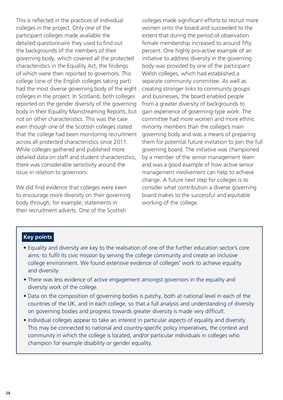
• Equality and diversity are key to the realisation of one of the further education sector's core
aims: to fulfil its civic mission by serving the college community and create an inclusive
college environment. We found extensive evidence of colleges' work to achieve equality
and diversity.
• There was less evidence of active engagement amongst governors in the equality and
diversity work of the college.
• Data on the composition of governing bodies is patchy, both at national level in each of the
countries of the UK, and in each college, so that a full analysis and understanding of diversity
on governing bodies and progress towards greater diversity is made very difficult.
• Individual colleges appear to take an interest in particular aspects of equality and diversity.
This may be connected to national and country-specific policy imperatives, the context and
community in which the college is located, and/or particular individuals in colleges who
champion for example disability or gender equality.
Key points
28
This is reflected in the practices of individual
colleges in the project. Only one of the
participant colleges made available the
detailed questionnaire they used to find out
the backgrounds of the members of their
governing body, which covered all the protected
characteristics in the Equality Act, the findings
of which were then reported to governors. This
college (one of the English colleges taking part)
had the most diverse governing body of the eight
colleges in the project. In Scotland, both colleges
reported on the gender diversity of the governing
body in their Equality Mainstreaming Reports, but
not on other characteristics. This was the case
even though one of the Scottish colleges stated
that the college had been monitoring recruitment
across all protected characteristics since 2011.
While colleges gathered and published more
detailed data on staff and student characteristics,
there was considerable sensitivity around the
issue in relation to governors.
We did find evidence that colleges were keen
to encourage more diversity on their governing
body through, for example, statements in
their recruitment adverts. One of the Scottish
colleges made significant efforts to recruit more
women onto the board and succeeded to the
extent that during the period of observation
female membership increased to around fifty
percent. One highly pro-active example of an
initiative to address diversity in the governing
body was provided by one of the participant
Welsh colleges, which had established a
separate community committee. As well as
creating stronger links to community groups
and businesses, the board enabled people
from a greater diversity of backgrounds to
gain experience of governing-type work. The
committee had more women and more ethnic
minority members than the college's main
governing body and was a means of preparing
them for potential future invitation to join the full
governing board. The initiative was championed
by a member of the senior management team
and was a good example of how active senior
management involvement can help to achieve
change. A future next step for colleges is to
consider what contribution a diverse governing
board makes to the successful and equitable
working of the college.